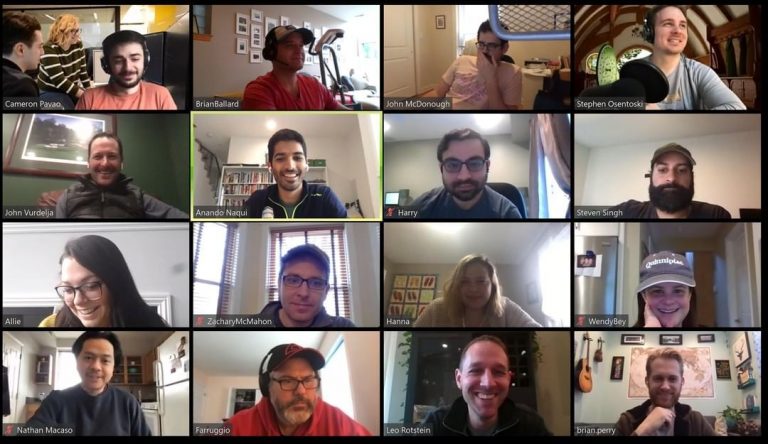
Tips for COVID-19 and Beyond: Building Company Culture Remotely
We’re officially at the one-year mark of the pandemic, which means it’s been over 365 days since any of us were in the office together. And while we won’t turn this post into a lament for face-to-face meetings, team lunches, or the six-pack of beer that’s surely gone bad in the office fridge, we do miss seeing one another! Although most Avatria employees work remotely at least part time in a non-pandemic world, we also place a lot of importance in our office culture.
As a relatively small company, we believe that our culture is inextricably intertwined with our strengths as an organization. Our core cultural values—trust, inclusion, cross-team relationships, and caring for one another as people—are designed to create a supportive and comfortable work environment, which we hope will translate into better work and greater investment in our mission.
We work hard to foster these values. A candidate’s ability to exemplify these traits is a key consideration during hiring, and we have a committee (the Culture Crew, as we call it, of which the two of us are members) focused on planning events and brainstorming other ways to stimulate team bonding. When COVID hit and face-to-face interaction became impossible, we knew we were in for a challenge. We’ve been fortunate to be able to grow our team size by over 25% since the pandemic began, which has made the development of these programs even more crucial. We had to get creative to keep Avatria culture strong over the last year, and so we wanted to share some of the strategies we’ve found successful.

Virtual Events
In our experience, facilitating non-work-related employee interaction is one of the best way to keep up morale and make the company feel connected. As such, we started off by planning a virtual happy hour (alcohol optional), hoping to replicate some of the fun of our monthly team outings. Though it was nice to see everyone, we quickly realized that big Zoom calls aren’t the most satisfying social activities. It’s too easy for multiple people to be talking at once, and the free-for-all format can make it hard for shy or quiet team members to fully participate. However, there are a few things we’ve done that have made our virtual events a lot more fun for everyone involved:
Plan activities
Playing a game is a great way get everyone involved, and minimizes the cacophony of a free-for-all style conversation. We’ve experimented a number of party games that translate well to a virtual setting: Jackbox, Codenames, Among Us—we even planned a round of virtual Family Feud that ended up being a blast!
Break into small groups
Even during in-person happy hours and events, large group conversations rarely work. A few people will pair off here, a few more there, and then people circulate. It’s just easier to have a conversation with three or four people than it is with ten or fifteen. The same rule holds true with virtual events.
To accomplish this, we’ve taken to scheduling monthly virtual lunches. These are smaller groups than our Virtual Happy Hours, with no more than five or six people included per call. They allow people to chat and hang out like they would around the lunch table at the office. We also randomize them, so that people from different teams get a chance to interact with coworkers they don’t get to see very often otherwise.
Use ice breakers with new employees
It can be intimidating to come into a tight-knit group as a new employee, especially if your first exposure to everyone is on a 20-person Zoom happy hour. Ice breakers are an easy way to help. It gives the new employee a natural chance to talk, and can help bring them up to speed on all the personalities on the team. (Who’s the tortured Michigan fanatic? Who goes running when it’s two below?)
Try chat-based or non-live events
Quality interactions don’t necessarily have to be face-to-face, or even camera-to-camera. We’ve had a lot of success hosting events that are intended to stimulate short interactions throughout the work day. Team Trivia is a great example of this; we’ll send out a handful of questions first thing in the morning, and teams have all day to discuss their answers over Slack. Hold the tournament over a week or two, reveal the answers and leaders each morning, and create a common Slack channel for different teams to talk trash and complain about trick questions. Similarly, we organized a game of Mafia that took place in a similar fashion that ended up being a huge hit. These types of events allow people to interact on their own schedules, and get some competitive juices flowing.
We’ve also held events that take place entirely offline, like a Wellness Challenge and Scavenger Hunt (of embarrassing household items). In general, if you can get people engaged in a common activity and create a Slack channel, the conversation will come.
Care Packages
One thing you can miss in a remote work environment are the small perks of working in an office—the snack box, the occasional Friday donuts, the seltzer and soda-stuffed fridge. With those items no longer eating into our budget, we decided to recycle that money and send people reminders that we appreciate them. The first care package went out a week or two after we transitioned to work from home, and was made up of face masks and snacks. Since then, we’ve sent small packages out every month or two, focused on seasonal treats. Care packages don’t have to be elaborate, or be a hassle to manage; even a small surprise can bring some joy during a stressful time.
Listening to Employees
Ultimately, the best way to build a positive company culture is to make sure your employees enjoy the programming you put on. Although the Culture Crew is responsible for planning Avatria events, we’ve always sought ideas, feedback, and input from the rest of the company. Not only does it help take some of the pressure off us, but it has led to some of most popular ideas (the Wellness Challenge and Scavenger Hunt, for example). And of course, acting on employee suggestions is good for culture in and of itself! Knowing you have a real voice is a powerful morale booster, and makes it more likely that you’ll exercise it in the future.
Conclusion
COVID hasn’t been easy on anyone. From the increased burden of childcare, to the anxieties of sick family and friends, to the stresses of isolation and lost hobbies, no one has been unaffected. That’s why it’s more important than ever that organizations do what they can to take some of the mental burden of quarantine off their employees. Growing a supportive, positive workplace culture isn’t something that happens overnight, but it doesn’t take much to plant the seeds.
If you haven’t done so already, consider creating your own Culture Crew! A little time and money goes a long way, and in the end, it’ll all come back to you in the form of happier, more productive employees.
